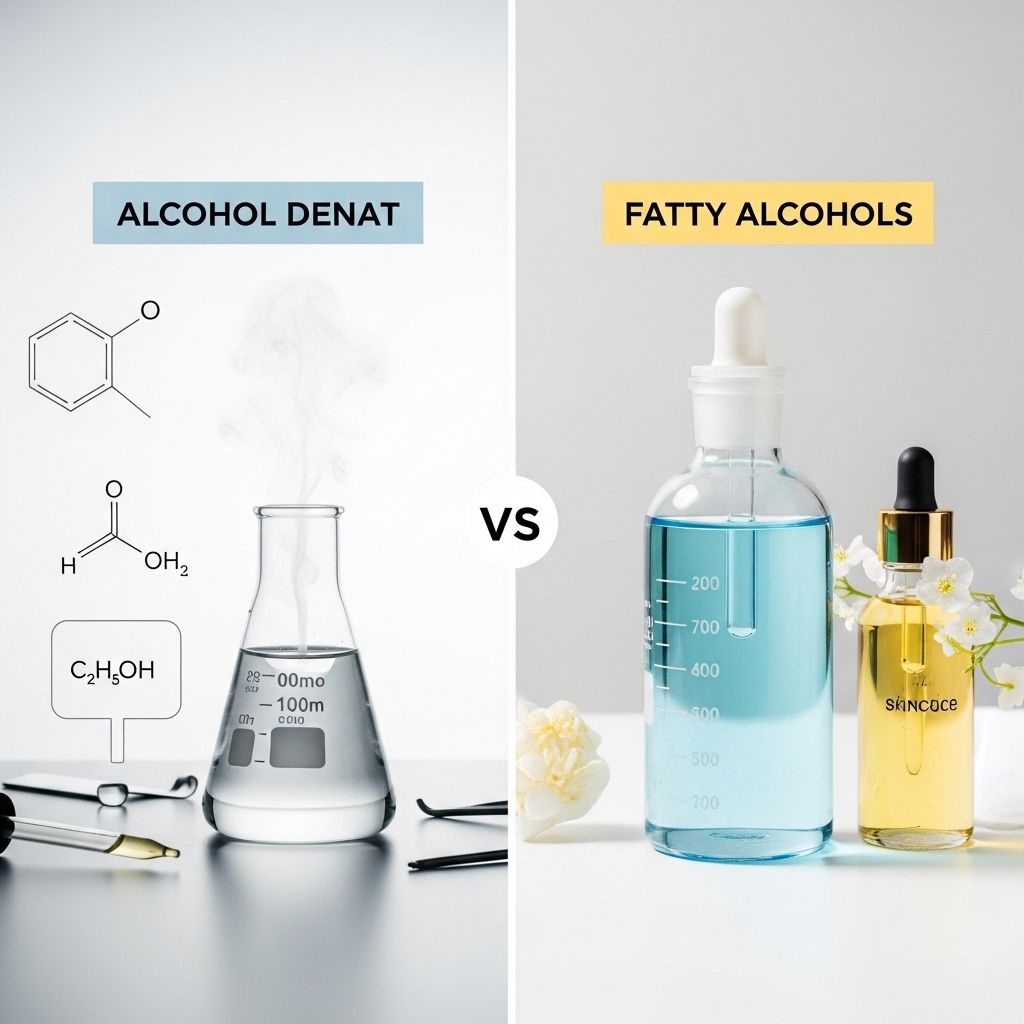Alcohol Denat vs. Fatty Alcohols in Skincare
Choosing the right ingredient can help maintain a healthy barrier and lasting moisture.

Alcohol Denat vs. Fatty Alcohols in Skincare: Understanding the Differences
When it comes to skincare, the term “alcohol” often raises concerns due to its potential to dry out and irritate the skin. However, not all alcohols are created equal. There are two main types of alcohols used in skincare products:
alcohol denat (denatured alcohol)
andfatty alcohols
. Each serves different purposes and has distinct effects on the skin. In this article, we will delve into the differences between these two types of alcohols, their benefits, and how they are used in various skincare products.Understanding Alcohol Denat in Skincare
Alcohol denat, also known as denatured ethanol, is a mixture of ethanol with additives to prevent it from being consumed. It is commonly used in skincare products for a variety of reasons:
- Astringent Properties: Alcohol denat is known for its astringent properties, which can help reduce pores and control oil production, making it suitable for oily skin types or for treating acne.
- Antimicrobial Activity: It possesses antimicrobial properties, which can help prevent the growth of bacteria and other microorganisms on the skin.
- Preservative Actions: It acts as a preservative, helping to extend the shelf life of skincare products by inhibiting microbial growth.
However, alcohol denat can be drying and irritating, especially for dry or sensitive skin. It may strip the skin of its natural oils, disrupt the skin barrier, and cause irritation such as redness and itchiness.
Understanding Fatty Alcohols in Skincare
Fatty alcohols, on the other hand, are derived from natural fats and oils and are considered “good alcohols” in skincare. They are primarily used for their emollient and moisturizing properties. Examples include cetyl alcohol, stearyl alcohol, and cetearyl alcohol, which are often used in skincare products for the following reasons:
- Emollient and Moisturizing Properties: Fatty alcohols help to soften and smooth the skin, providing significant moisturizing benefits. They are particularly beneficial for maintaining the skin’s barrier function and preventing moisture loss.
- Emulsification and Texture Enhancement: These alcohols act as emulsifiers, allowing water and oil to mix, which is essential for creating a stable and smooth texture in creams and lotions.
- Skin Barrier Support: They help to strengthen the skin barrier, reducing inflammation and improving skin hydration levels. This makes them especially beneficial for conditions like eczema and rosacea.
Comparison of Alcohol Denat and Fatty Alcohols
Here is a comparison of alcohol denat and fatty alcohols in terms of their effects and uses in skincare:
| Type of Alcohol | Effects on Skin | Uses in Skincare |
|---|---|---|
| Alcohol Denat | Drying, astringent, potential for irritation | Astringent, antimicrobial, preservative |
| Fatty Alcohols | Moisturizing, emollient, barrier support | Emollients, emulsifiers, skin barrier support |
Choosing the Right Alcohol for Your Skincare Needs
When selecting skincare products, it is essential to consider your skin type and needs:
- For Oily Skin: Products containing alcohol denat might be beneficial for controlling oil production and reducing acne. However, use in moderation as it can still cause dryness over time.
- For Dry or Sensitive Skin: Fatty alcohols are more suitable, as they provide moisturizing benefits and support the skin barrier without causing irritation.
Frequently Asked Questions (FAQs)
Q: What are the main differences between alcohol denat and fatty alcohols?
A: Alcohol denat is a drying agent often used for its astringent and antimicrobial properties, while fatty alcohols, such as cetyl and stearyl alcohol, are moisturizing and support the skin barrier.
Q: Can I use alcohol denat on dry skin?
A: It is generally not recommended to use alcohol denat on dry skin, as it can further dry out and irritate the skin. Instead, opt for fatty alcohols for their moisturizing benefits.
Q: How do fatty alcohols support the skin barrier?
A: Fatty alcohols help strengthen the skin barrier by improving lipid layer cohesion, reducing moisture loss, and providing a protective film on the skin’s surface.
Conclusion
In conclusion, while alcohol denat can be beneficial for certain skin types due to its astringent properties, it is important to use it with caution to avoid drying and irritation. Fatty alcohols, on the other hand, are generally more beneficial for most skin types, offering moisturizing and barrier-supporting benefits without the drying effects. Understanding the differences between these types of alcohols can help you choose the most effective and gentle skincare products tailored to your specific skin needs.
References
- https://elchemy.com/blogs/personal-care/not-all-alcohols-are-bad-the-skincare-secret-of-fatty-alcohols
- https://skinsort.com/guide/types-of-alcohol-skincare
- https://curology.com/blog/alcohols-in-skincare-friend-or-foe/
- https://www.seafloraskincare.com/understanding-alcohols-in-skincare-the-good-the-bad-and-the-nurturing/
- https://skintypesolutions.com/blogs/skincare/alcohol-as-an-ingredient-in-skin-care-products
- https://us.amperna.com/blogs/news/alcohol-in-skincare-good-vs-the-bad
- https://www.musimmas.com/resources/blogs/what-are-fatty-alcohols-in-skincare/
- https://www.beautycarechoices.com/blog/alcohol-free-styling-good-bad-alcohols
Read full bio of Sneha Tete












